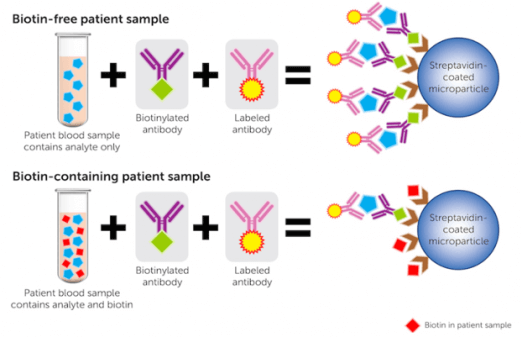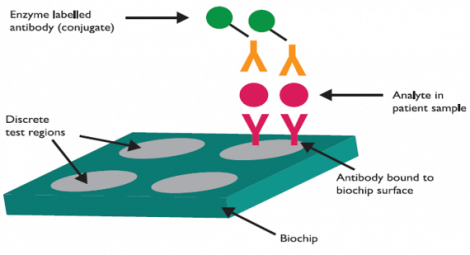Biotin supplementation interference in health testing
Biotin supplementation interference in health testing

12 February 2021
Biotin supplementation interference in health testing
How much do you know about Biotin? Commonly known as Vitamin B7, Biotin is taken by as many as 20% of people, including high profile celebrities like Kylie Jenner, Kim Kardashian and Vanessa Hudgens, for its hair and nail-strengthening properties.
If you take biotin supplements, it is important to know the effects it can have on particular blood tests, should you visit your GP or local hospital.
Whilst there are various diagnostic health tests out there, including fertility hormone tests, prostate tests, and tests for troponin – a marker released into the blood during a heart attack – that are known to be affected by elevated levels of biotin, there are other tests available, including those provided by Randox, that are not impacted.
The reason that so many non-Randox tests are impacted by biotin is that biotin is widely used throughout the biotechnology industry in the development of diagnostic tests.
ELISA tests in particular (tests that measure the reaction of antibodies to identify a substance) often make use of antibodies labelled with biotin, to detect toxins or other foreign substances within the body.
In most instances, the biotin will bind to a protein called streptavidin. This bonding is the strongest non-covalent biological interaction known, and is therefore particularly useful in binding antibodies within diagnostic tests.
But with more and more people exceeding the recommended daily dosage for biotin (30 micrograms) by taking up to 10,000 micrograms of biotin in supplements marketed for beauty reasons, many diagnostic tests are being measured inaccurately. Excess biotin in the blood can block the binding of biotin-labelled antibodies to streptavidin within the tests, and the substance being tested won’t be measured accurately.
Laboratory professionals have known about this potential problem for some time. In late November 2017, the FDA (Food and Drug Administration) published a safety notice to make the public and healthcare practitioners more aware that biotin can “significantly interfere with certain lab tests and cause incorrect test results.”
The FDA even reported on one particular case in which a patient died following falsely low troponin (marker of a heart attack) results when the troponin test used was known to have biotin interference. Biotin supplements masked the true diagnosis of a heart attack.
Many patients taking biotin supplements have also been misdiagnosed with a condition called Graves’ disease, an autoimmune condition characterised by an overactive thyroid. In these cases, biotin supplementation led to falsely low levels of thyroid stimulating hormones, and falsely high levels of other thyroid hormones. This particular profile of hormones led to a Graves’ disease diagnosis, in spite of a lack of symptoms, which in Graves’ disease would usually include muscle weakness, a quickened heartbeat, sleeping problems, diarrhoea, weight loss and poor tolerance of heat.
In pregnant women, tests that are impacted by biotin interference may produce falsely low results of beta HCG, more commonly known as the ‘pregnancy hormone’ as it released by the placenta after conception. With low levels of beta HCG, and therefore no confirmation of pregnancy, pregnant women could be exposed to X-rays and CT scans that may harm the developing foetus.
So, what can be done? Suggestions have been made that patients taking biotin supplements should be made to wait before any diagnostic testing is conducted, so that the biotin clears from their system.
But this “Wait and Watch” approach certainly would not work in emergencies. In the case of a heart attack, testing must be conducted as soon as possible to allow for diagnosis, immediate medical intervention and follow-up testing.
At Randox, we are convinced that the risk of analytic interference by biotin supplementation is a serious problem that needs to be more widely recognised and promptly addressed.
In the GP setting, general practitioners must ask their patients if they are taking any biotin supplements and inform the testing laboratory if interference from biotin is a possibility. They should also consider that lab results not matching with a patient’s signs and symptoms may be caused by biotin interference.
In the acute care setting however, it is imperative that biotin technology is not used in diagnostic testing to protect patients from misdiagnosis and subsequently, further health problems.
This is why Randox’s patented Biochip Array Technology does not use biotin technology in its development. This revolutionary methodology, free from Biotin-Streptavidin is not impacted by elevated levels of biotin from supplementation in the same way as Biotin-Streptavidin tests.
So if you have been taking supplements for hair or nail growth, to ease symptoms associated with Multiple Sclerosis, for epilepsy or for a range of other health conditions, and your diagnostic testing has been conducted using Randox Biochip Array Technology, you can rest assured of true, accurate, and reliable results.
Randox Biochip Array Technology is interference-proof.
For further information on the Randox Biochip, visit https://www.randox.com/multiplex-testing/
For any additional questions, please contact Randox PR by email: randoxpr@randox.com or by phoning 028 9442 2413
Want to know more about Randox?
Contact us or visit our homepage to view more.
Our COVID-19 Products and Services
HOME TEST
ANTIBODY TEST
TRAVEL CERTIFICATE
LABORATORY TOOLS
Biotin Supplementation Interference in Health Diagnostic Testing
Continuing our theme of Biotin (Vitamin B7) this month, we turn our attention to its role in diagnostic testing.
With as many as 20% of people taking biotin-containing supplements, including high profile celebrities such as Kylie Jenner, Kim Kardashian and Vanessa Hudgens, it is important to know the effects it can have on particular blood tests, should you visit your GP or local hospital.
Whilst there are various diagnostic health tests out there, including fertility hormone tests, prostate tests, and tests for troponin – a marker released into the blood during a heart attack – that are known to be affected by elevated levels of biotin, there are other tests available, including those provided by Randox, that are not impacted.
The reason that so many non-Randox tests are impacted by biotin is that biotin is widely used throughout the biotechnology industry in the development of diagnostic tests.
ELISA tests in particular (tests that measure the reaction of antibodies to identify a substance) often make use of antibodies labelled with biotin, to detect toxins or other foreign substances within the body.
In most instances, the biotin will bind with high affinity to a protein called streptavidin. This affinity of streptavidin for biotin is the strongest non-covalent biological interaction known, and is therefore particularly useful in binding antibodies within diagnostic tests.
But with more and more people exceeding the recommended daily dosage for biotin (30 micrograms) by taking up to 10,000 micrograms of biotin in supplements marketed for beauty reasons, many diagnostic tests are being measured inaccurately. Excess biotin in the blood can block the binding of biotin-labelled antibodies to streptavidin within the tests, and the substance being tested won’t be measured accurately.
Laboratory professionals have known about this potential problem for some time. In late November 2017, the FDA (Food and Drug Administration) published a safety notice to make the public and healthcare practitioners more aware that biotin can “significantly interfere with certain lab tests and cause incorrect test results.”
The FDA even reported on one particular case in which a patient died following falsely low troponin (marker of a heart attack) results when the troponin test used was known to have biotin interference. Biotin supplements masked the true diagnosis of a heart attack.
Many patients taking biotin supplements have also been misdiagnosed with a condition called Graves’ disease, an autoimmune condition characterised by an overactive thyroid. In these cases, biotin supplementation led to falsely low levels of thyroid stimulating hormones, and falsely high levels of other thyroid hormones. This particular profile of hormones led to a Graves’ disease diagnosis, in spite of a lack of symptoms, which in Graves’ disease would usually include muscle weakness, a quickened heartbeat, sleeping problems, diarrhoea, weight loss and poor tolerance of heat.
In pregnant women, tests that are impacted by biotin interference may produce falsely low levels of beta HCG, more commonly known as the ‘pregnancy hormone’ as it released by the placenta after conception. With low levels of beta HCG, and therefore no confirmation of pregnancy, pregnant women could be exposed to X-rays and CT scans that may harm the developing foetus.
So, what can be done? Suggestions have been made that patients taking biotin supplements should be made to wait before any diagnostic testing is conducted, so that the biotin clears from their system.
But this “Wait and Watch” approach certainly would not work in emergencies. In the case of a heart attack, testing must be conducted as soon as possible to allow for diagnosis, immediate medical intervention and follow-up testing.
At Randox, we are convinced that the risk of analytic interference by biotin supplementation is a serious problem that needs to be more widely recognised and promptly addressed.
In the GP setting, general practitioners must ask their patients if they are taking any biotin supplements and inform the testing laboratory if interference from biotin is a possibility. They should also consider that lab results not matching with a patient’s signs and symptoms may be caused by biotin interference.
In the acute care setting however, it is imperative that biotin technology is not used in diagnostic testing to protect patients from misdiagnosis and subsequently, further health problems.
This is why Randox’s patented Biochip Array Technology does not use biotin technology in its development. This revolutionary methodology, free from Biotin-Streptavidin is not impacted by elevated levels of biotin from biotin supplementation in the same way as Biotin-Streptavidin tests.
So if you have been taking biotin supplements for hair or nail growth, to ease symptoms associated with Multiple Sclerosis, for epilepsy or for a range of other health conditions, and your diagnostic testing has been conducted using Randox Biochip Array Technology, you can rest assured of true, accurate, and reliable results.
Randox Biochip Array Technology is interference-proof.
For further information on the Randox Biochip, visit https://www.randox.com/multiplex-testing/
For any additional questions, please contact Randox PR by email: randoxpr@randox.com or by phoning 028 9442 2413
Health Theme August 2018: The role of Biotin / Vitamin B7
How much do you know about Biotin? Taken by a wealth of celebrities including Kylie Jenner, Kim Kardashian and Vanessa Hudgens for its hair and nail-strengthening properties, this vitamin has grown in popularity in recent years.
Commonly known as Vitamin B7, Biotin is a water-soluble vitamin found in bodily enzymes which metabolise fat and carbohydrates.
It therefore plays an important role in cell growth and in maintaining a steady blood sugar level, and also assists in various reactions, including the movement of carbon dioxide around the body. It is often recommended as a dietary supplement for strengthening hair and nails, and as such is often found in many cosmetics and health products for the hair and skin.
Due to its key role within the body, the National Academy of Medicine (formerly the Institute of Medicine) recommends a dose of 30 micrograms of biotin each day, from a range of food sources including beef or pork, egg, yeast, whole wheat bread, avocado, salmon, cauliflower or cheese. Raw egg whites however contain a particular protein that blocks the absorption of biotin, so people who regularly consume a large number of eggs may become biotin-deficient.
Those suffering from biotin deficiency disorders therefore are often prescribed biotin supplements – up to as much as 300 milligrams per day for Multiple Sclerosis patients, for whom the B group vitamins are vital in managing symptoms. Biotin in particular is very useful in cases of progress MS because it supports nerve cell metabolism.
There are also some inherited metabolic disorders which, due to a deficiency in the enzymes which process biotin, prevent the body’s cells from using it effectively.
Usually, however, biotin deficiency occurs simply from an absence of the vitamin in the diet, particularly in breastfeeding mothers. Symptoms of deficiency include:
- Conjunctivitis
- Dermatitis in the form of a scaly red rash
- Neurological symptoms in adults including depression, lethargy, hallucination, numbness and tingling of the extremities
- Brittle and thin fingernails
- Hair loss (alopecia)
Supplements may also be recommended to those suffering from alcoholism, patients who have had partial removal of their stomach, burn patients, epileptics, elderly individuals, athletes, and pregnant women, who have a higher risk of biotin deficiency. It is estimated that as many as 20% of people consume Biotin-containing supplements.
While biotin supplements may help pregnant women and some people with other health disorders, it is of course incredibly important to eat a balanced and healthy diet that includes all the vitamins and minerals necessary for normal body function.
Take time to consider how you can incorporate appropriate and safe amounts of biotin into your daily diet.
For further information, please contact Randox PR by email: randoxpr@randox.com or by phoning 028 9442 2413
Randox Biochip Array (BAT) Technology free from Biotin-Streptavidin
![Biotin - landing page banner[2] Biotin](https://www.randox.com/wp-content/uploads/2018/07/xBiotin-landing-page-banner2.jpg.pagespeed.ic.33PpDA8fvo.jpg)
Biotin, also known as vitamin B7, is involved with fatty acid metabolism, amino acid degradation, and gluconeogenesis. The recommended daily intake for biotin is roughly 30-70µg, which is extremely low, meaning that biotin deficiency is rare. Recently, there has been a surge in biotin supplementation mainly for beauty reasons, including: stronger nails and healthier skin and hair, resulting in the biotin craze on Instagram. Currently 162K posts are attributed to the biotin hashtag (#biotin) on Instagram. Whilst biotin supplementation is beneficial for numerous health conditions, including: multiple sclerosis (MS), diabetes, elevated cholesterol, and metabolic dysfunction, the increasing use of biotin by patients has created a problem with in vitro diagnostic testing.
With numerous manufacturers using biotin-streptavidin technology to develop in vitro diagnostic tests, combined with the rise in biotin supplementation use, the FDA (food and drug administration) issued an alert regarding the potential for erroneous results triggered by high levels of biotin in patient samples, at the end of 2017. Clinical decisions based on these false results from biotin technology can lead to inaccurate diagnosis and inappropriate treatment prescribed. The FDA confirmed that a patient, who was consuming high levels of biotin, died when a troponin tested was skewed and failed to show that the patient was having a heart attack. Other tests that can produce erroneous results include: cardiac, pregnancy, cancer and iron-deficiency tests.

(Halasey, 2018)
The image above highlights that in biotin-free patient samples, the analyte to be tested successfully binds to the biotinylated antibody and the labelled antibody ultimately ensuring accurate measurement. In the patient sample containing high levels of biotin, the biotin inhibits streptavidin’s ability to capture the analyte-antibody complex, generating falsely lowered results.
As 70% of all clinical decisions are based on results from in vitro diagnostic tests, it is vital that laboratories are selecting in vitro diagnostic tests that do not adopt the biotin-streptavidin technology to ensure accurate patient testing.
Randox do not utilise the biotin-streptavidin technology in the development of the Biochip Array Technology (BAT).

The Randox Biochip facilitates multiplex testing for faster, more comprehensive patient testing. This technology, free from biotin-streptavidin, uses capture antibodies bound to a solid substrate (biochip surface) as opposed to biotinylated antibodies used by other manufacturers. The Biochip also utilises enzyme labelled conjugate to enable chemiluminescent detection of the target in the patient sample.
Biochip test menu

The Biochip Array Technology (BAT) from Randox is capable of simultaneous multi-analyte diagnostic testing within the fields of clinical research and drugs of abuse testing. The technology works through combining a panel of related assays on a single biochip with a single set of reagents, controls and calibrators. An extensive range of Biochip panels are available, each optimised to provide the best performance.
Evidence

The evidence analyser is the world’s first protein Biochip Array Technology system and has truly transformed laboratory diagnostics worldwide. As the first of its kind, the Evidence has introduced higher standards of quality efficiency and reliability to numerous sectors including hospitals and clinical laboratories, forensic and clinical toxicology, pharmaceutical/CRO applications, as well as veterinary laboratories.
Evidence Evolution

The world’s first fully automated random access Biochip testing platform. The Evidence Evolution is set to revolutionise current diagnostic testing. With the capability to process up to 2,640 tests per hour, the Evidence Evolution utilises multiplexing technology, offering advanced test consolidation, patient profiling, a complete system integration, as well as the most comprehensive test menu on the market.
Investigator

The #1 choice for research, clinical, forensic, and veterinary testing. Using the multiplexing technology, the semi-automated benchtop immunoanalyser Evidence Investigator is suitable for medium throughput laboratories. In addition to the current test menu for this analyser, Randox have new tests in development.
Reference:
Halasey. S, 2018, “Inside Track: Biotin Gets a Safety Alert”. Available from URL: http://www.clpmag.com/2018/01/inside-track-biotin-gets-safety-alert/


